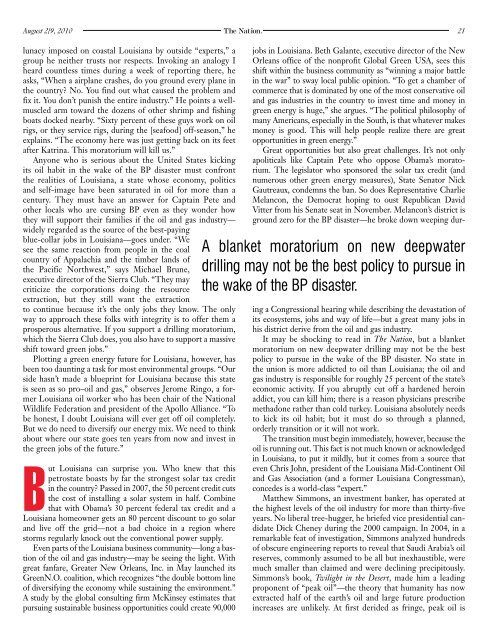You also want an ePaper? Increase the reach of your titles
YUMPU automatically turns print PDFs into web optimized ePapers that Google loves.
August 2/9, 2010<br />
lunacy imposed on coastal Louisiana by outside “experts,” a<br />
group he neither trusts nor respects. Invoking an analogy I<br />
heard countless times during a week of reporting there, he<br />
asks, “When a airplane crashes, do you ground every plane in<br />
the country? No. You find out what caused the problem and<br />
fix it. You don’t punish the entire industry.” He points a wellmuscled<br />
arm toward the dozens of other shrimp and fishing<br />
boats docked nearby. “Sixty percent of these guys work on oil<br />
rigs, or they service rigs, during the [seafood] off-season,” he<br />
explains. “<strong>The</strong> economy here was just getting back on its feet<br />
after Katrina. This moratorium will kill us.”<br />
Anyone who is serious about the United States kicking<br />
its oil habit in the wake of the BP disaster must confront<br />
the realities of Louisiana, a state whose economy, politics<br />
and self-image have been saturated in oil for more than a<br />
century. <strong>The</strong>y must have an answer for Captain Pete and<br />
other locals who are cursing BP even as they wonder how<br />
they will support their families if the oil and gas industry—<br />
widely regarded as the source of the best-paying<br />
blue-collar jobs in Louisiana—goes under. “We<br />
see the same reaction from people in the coal<br />
country of Appalachia and the timber lands of<br />
the Pacific Northwest,” says Michael Brune,<br />
executive director of the Sierra Club. “<strong>The</strong>y may<br />
criticize the corporations doing the resource<br />
extraction, but they still want the extraction<br />
to continue because it’s the only jobs they know. <strong>The</strong> only<br />
way to approach these folks with integrity is to offer them a<br />
prosperous alternative. If you support a drilling moratorium,<br />
which the Sierra Club does, you also have to support a massive<br />
shift toward green jobs.”<br />
Plotting a green energy future for Louisiana, however, has<br />
been too daunting a task for most environmental groups. “Our<br />
side hasn’t made a blueprint for Louisiana because this state<br />
is seen as so pro–oil and gas,” observes Jerome Ringo, a former<br />
Louisiana oil worker who has been chair of the <strong>Nation</strong>al<br />
Wildlife Federation and president of the Apollo Alliance. “To<br />
be honest, I doubt Louisiana will ever get off oil completely.<br />
But we do need to diversify our energy mix. We need to think<br />
about where our state goes ten years from now and invest in<br />
the green jobs of the future.”<br />
But Louisiana can surprise you. Who knew that this<br />
petro state boasts by far the strongest solar tax credit<br />
in the country? Passed in 2007, the 50 percent credit cuts<br />
the cost of installing a solar system in half. Combine<br />
that with Obama’s 30 percent federal tax credit and a<br />
Louisiana homeowner gets an 80 percent discount to go solar<br />
and live off the grid—not a bad choice in a region where<br />
storms regularly knock out the conventional power supply.<br />
Even parts of the Louisiana business community—long a bastion<br />
of the oil and gas industry—may be seeing the light. With<br />
great fanfare, Greater New Orleans, Inc. in May launched its<br />
GreenN.O. coalition, which recognizes “the double bottom line<br />
of diversifying the economy while sustaining the environment.”<br />
A study by the global consulting firm McKinsey estimates that<br />
pursuing sustainable business opportunities could create 90,000<br />
<strong>The</strong> <strong>Nation</strong>. 21<br />
jobs in Louisiana. Beth Galante, executive director of the New<br />
Orleans office of the nonprofit Global Green USA, sees this<br />
shift within the business community as “winning a major battle<br />
in the war” to sway local public opinion. “To get a chamber of<br />
commerce that is dominated by one of the most conservative oil<br />
and gas industries in the country to invest time and money in<br />
green energy is huge,” she argues. “<strong>The</strong> political philosophy of<br />
many Americans, especially in the South, is that whatever makes<br />
money is good. This will help people realize there are great<br />
opportunities in green energy.”<br />
Great opportunities but also great challenges. It’s not only<br />
apoliticals like Captain Pete who oppose Obama’s moratorium.<br />
<strong>The</strong> legislator who sponsored the solar tax credit (and<br />
numerous other green energy measures), State Senator Nick<br />
Gautreaux, condemns the ban. So does Representative Charlie<br />
Melancon, the Democrat hoping to oust Republican David<br />
Vitter from his Senate seat in November. Melancon’s district is<br />
ground zero for the BP disaster—he broke down weeping dur-<br />
A blanket moratorium on new deepwater<br />
drilling may not be the best policy to pursue in<br />
the wake of the BP disaster.<br />
ing a Congressional hearing while describing the devastation of<br />
its ecosystems, jobs and way of life—but a great many jobs in<br />
his district derive from the oil and gas industry.<br />
It may be shocking to read in <strong>The</strong> <strong>Nation</strong>, but a blanket<br />
moratorium on new deepwater drilling may not be the best<br />
policy to pursue in the wake of the BP disaster. No state in<br />
the union is more addicted to oil than Louisiana; the oil and<br />
gas industry is responsible for roughly 25 percent of the state’s<br />
economic activity. If you abruptly cut off a hardened heroin<br />
addict, you can kill him; there is a reason physicians prescribe<br />
methadone rather than cold turkey. Louisiana absolutely needs<br />
to kick its oil habit; but it must do so through a planned,<br />
orderly transition or it will not work.<br />
<strong>The</strong> transition must begin immediately, however, because the<br />
oil is running out. This fact is not much known or acknowledged<br />
in Louisiana, to put it mildly, but it comes from a source that<br />
even Chris John, president of the Louisiana Mid-Continent Oil<br />
and Gas Association (and a former Louisiana Congressman),<br />
concedes is a world-class “expert.”<br />
Matthew Simmons, an investment banker, has operated at<br />
the highest levels of the oil industry for more than thirty-five<br />
years. No liberal tree-hugger, he briefed vice presidential candidate<br />
Dick Cheney during the 2000 campaign. In 2004, in a<br />
remarkable feat of investigation, Simmons analyzed hundreds<br />
of obscure engineering reports to reveal that Saudi Arabia’s oil<br />
reserves, commonly assumed to be all but inexhaustible, were<br />
much smaller than claimed and were declining precipitously.<br />
Simmons’s book, Twilight in the Desert, made him a leading<br />
proponent of “peak oil”—the theory that humanity has now<br />
extracted half of the earth’s oil and large future production<br />
increases are unlikely. At first derided as fringe, peak oil is




